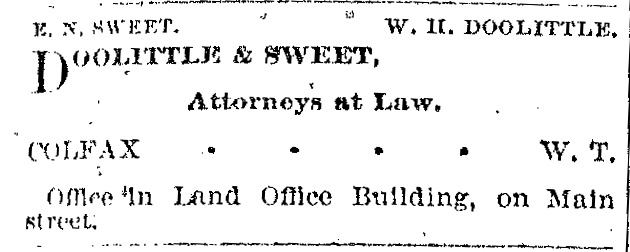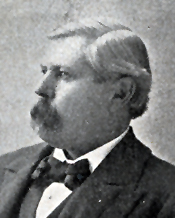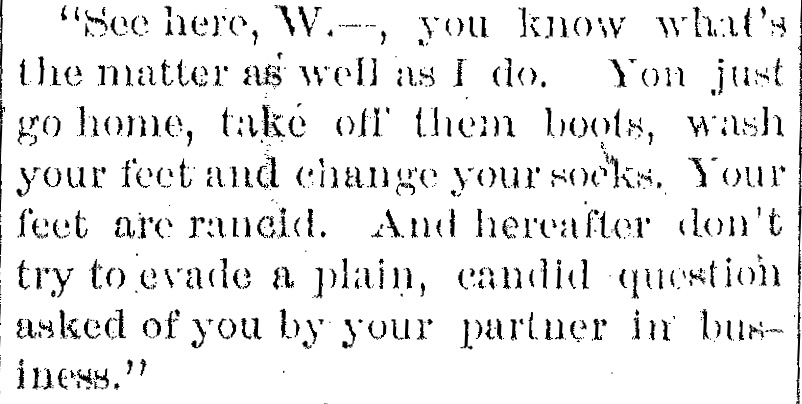Limburger Fiend Raises a Stink in Colfax
From the desk of Steve Willis, Central Library Services Program Manager of the Washington State Library:
Sometimes the inside joke behind these eccentric pioneer news articles is just as entertaining as the work itself. Such is the case with this essay I found in The Weekly Vidette (Colfax, Wash.), April 19, 1883:
LIMBURGER
How a Colfax Lawyer had Probably Been Cured of a Bad Habit
“Some fiend incarnate, during the past two weeks, has introduced within the city limits of Colfax, a cargo of that nauseating and marrow-searching article, Limburger cheese. While some persons may fancy this kind of edible as a dainty luxury, or even as a daily diet (from whom the Lord deliver us) others have not the fortitude to eat that which, even should their palate hanker for, their nose will tell them every time it is too utterly unfit to feed to an obnoxious mother-in-law. It is strong enough to lift the mortgage off a 40-acre farm, and as for smell, it would put a skunk or dead horse to the blush. It is said that a buzzard after inflating itself with carrion, will turn its head to windward in order to get away from its own breath. Buzzards are a notch ahead of the Limburger fiend in the scale of common decency. The latter not only has no care for his own nasal organ, but will go about  town among the best friends he’s got, drop into the post office, saloon, or anywhere, and if bystanders don’t happen to be aware of his ‘weakness’ for Limburger, they probably think that the man who stands or is sitting next to them had better go home and change his stockings or undershirt, when in fact the innocent party might be the cleanest of men, and he himself may be, in silent thought, regarding the party aforesaid with mingled disgust and pity. And all this on account of the man who has ‘failings’ for Limburger.”
town among the best friends he’s got, drop into the post office, saloon, or anywhere, and if bystanders don’t happen to be aware of his ‘weakness’ for Limburger, they probably think that the man who stands or is sitting next to them had better go home and change his stockings or undershirt, when in fact the innocent party might be the cleanest of men, and he himself may be, in silent thought, regarding the party aforesaid with mingled disgust and pity. And all this on account of the man who has ‘failings’ for Limburger.”
“A few of Colfax’s best citizens during the past two weeks have endeavored to educate their appetites a little in this direction, and among them was a young and rising lawyer of quiet demeanor and epicurean tastes. His partner in business, however, is somewhat older and of a more staid and sober temperament, and does not fancy particularly any such aesthetic foolishness as Limburger cheese. Well, our young friend, whom we will call W.—- for short, procured a small piece of Limburger and took it to his office wrapped in a nice square piece of brown paper, and after eating the cheese, left the paper lying on the office table. As it happened there was no cloth covering the table, and when W.—-‘s partner entered the office some time after, he smoothed the paper out, built up the office fire, and commenced to write, using the brown paper as sort of covering to the table on which to place his letter paper.”

“Along in the afternoon, as the room began to get heated up, a perceptible odor assailed his olfactories, and as it seemed to increase instead of diminish, he began to get nervous. But he kept writing away for some time before mentioning it to his partner, who sat opposite him with his feet elevated on the table at an angle of about 45 degrees and his body tipped back in a chair, busily talking to a client. At last the stench became so ‘numerous’ and ‘utterly intense’ that he commenced to wriggle in his chair, and finally called W.—- aside and said:”
“‘I’ve noticed an awful smell in here for the last two hours. I think I have noticed it in a lesser quantity frequently before in this room. It is unfamiliar stench to me. Don’t know what to make of it. Think you can fathom the mystery?'”
“W.—-, who until now, had forgotten all about leaving the brown paper on the table, and on glancing there had seen it when the above query was propounded, from motives of discretion did not choose to follow the example of the illustrious G.W., and replied that the origin of the smell was a mystery to him, and went back to his former seat and occupation, as also did his partner. The latter, though, seemed to be in a sort of brown study, and the pen lay inactive behind his ear. All at once his eyes brightened up, and casting a hurried look at W.—-‘s feet, which were in their former position, he said in a voice full of fatherly advice and patronage.”
“‘See here, W.—-, you know what’s the matter as well as I do. You just go home, take off them boots, wash your feet and change your socks. Your feet are rancid. And hereafter don’t try to evade a plain, candid question asked of you by your partner in business.'”
“Twere better that he had told the truth, the whole truth, and nothing but the (disgusting) truth.”
Discovering the identities of the two gentlemen in the story is not hard. The editor is one E.N. Sweet, the same E.N. Sweet listed in the newspaper advertising as part of the law firm of Doolittle and Sweet—Doolittle as in W.H. Doolittle, to be precise, hence the “W.—-.” Mr. Sweet was describing himself in the piece as “somewhat older and of a more staid and sober temperament.”
He was, in fact, Edgar Newell Sweet, born in Marshall, NY, Dec. 6, 1842. His family moved to Wisconsin, where Edgar began his training as printer. The Civil War disrupted his plans. He started as a private in the Wisconsin Cavalry in 1861 and ended up being mustered out as captain in the Far West in 1866. In between he saw action as far south as Louisiana.
After the War he married and started a family, settling in Nebraska where he was a newspaper editor. By the mid-1870s he was in Colfax and quickly became a town pillar, serving as mayor, judge, attorney, and newspaper editor. He appears to have moved to Oklahoma by the 1890s and spent his final years in California, where he died March 27, 1928.
William Hall Doolittle, the true identity of “W.—-,” was born in Erie County, Pa., Nov. 6, 1848. His love of Limburger cheese no doubt was due to his upbringing, for his family moved to Wisconsin in 1859 (today Wisconsin is home to the sole manufacturer of Limburger cheese in the U.S.). William served in the later part of the Civil War as a soldier in the 9th Wisconsin battery. After the War he studied law, moved to Nebraska and was elected to the State House.
Doolittle moved to Colfax in 1880 and practiced there until 1888 when he migrated to Tacoma. He was elected to the U.S. Congress and served for two terms, 1893-1897 as a Republican. After his defeat for re-election in 1896 he returned to the practice of law. He died in Tacoma February 26, 1914.
I stumbled across a mention of Sweet in The Wide Northwest / by Leoti L. West. She described him as “a dignified gentleman, who always had a cigar between his lips.” Hmmm. Hey, don’t get me wrong, I myself have been known to enjoy a good stogie now and then, but doesn’t it seem a bit disingenuous for a guy who always smokes a cigar to complain about Limburger? But I guess he enjoyed giving his law partner a hard time in public so much that he probably missed the irony.
You can follow any responses to this entry through the RSS 2.0 feed. Both comments and pings are currently closed.







